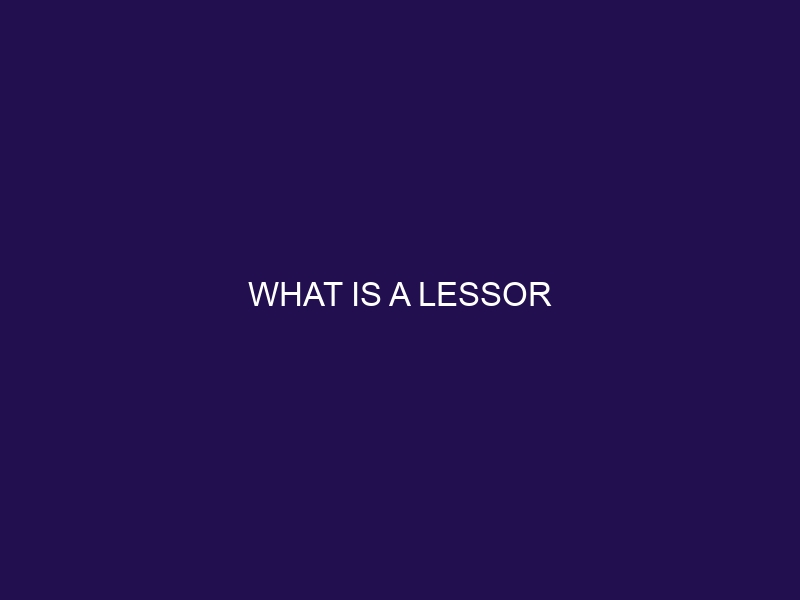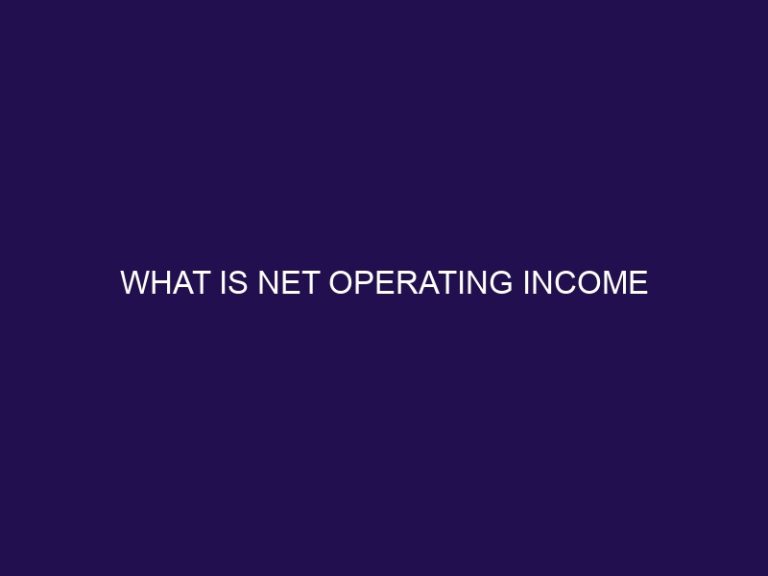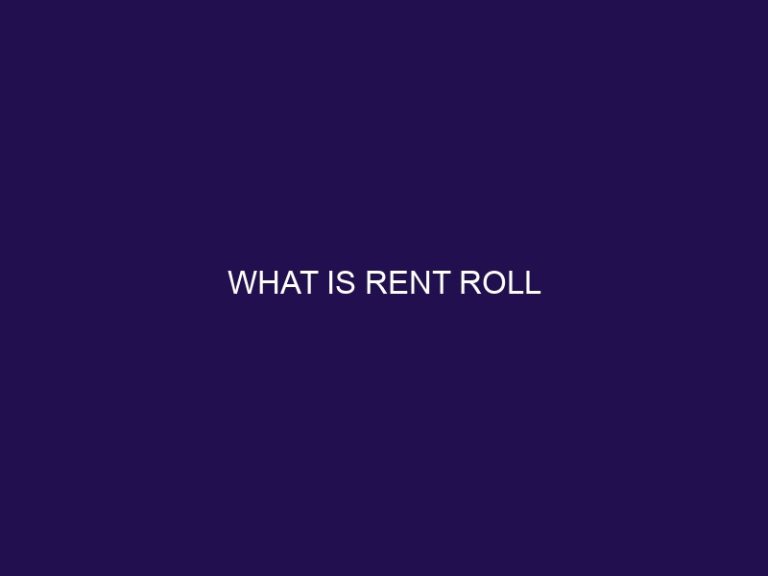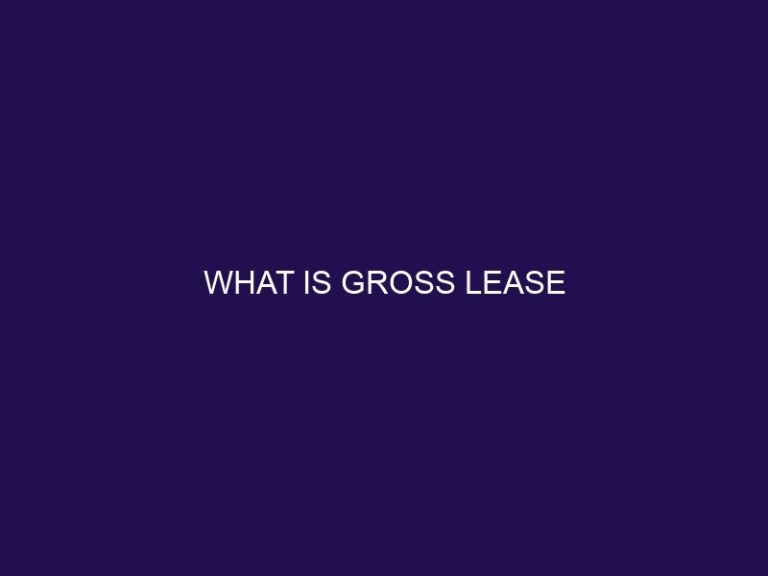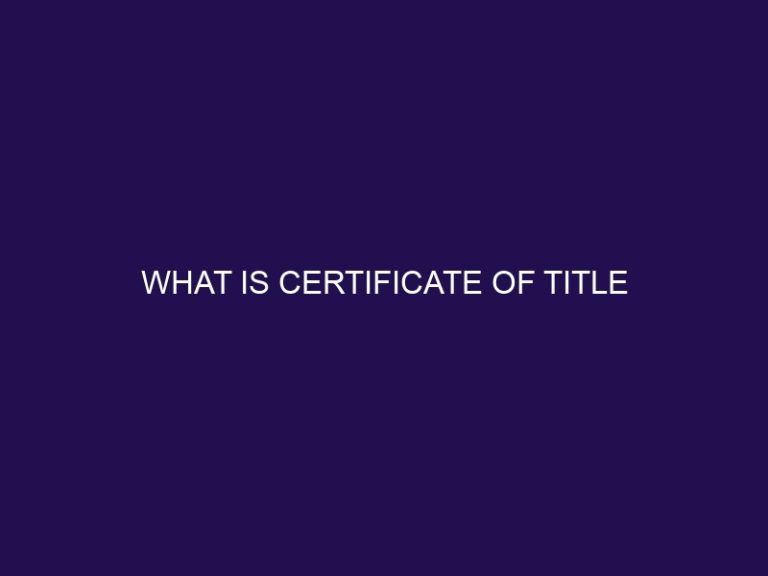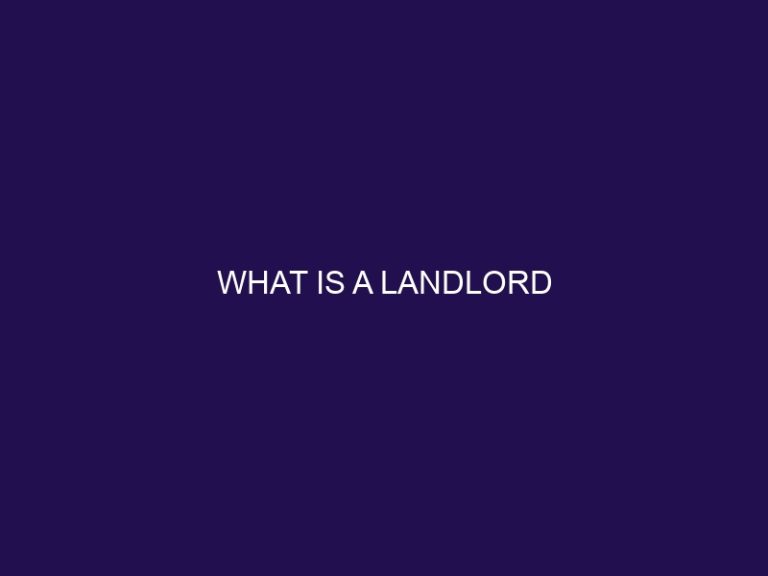What is a Lessor
html
A lessor plays a crucial role in the world of leasing and property management. Whether it’s renting out a residential space, commercial property, or equipment, the lessor holds certain rights, responsibilities, and obligations. Understanding the role of a lessor is essential for both lessors themselves and lessees.
A lessor is an individual or entity that owns a property or equipment and grants the right to use or possess it to another party, known as the lessee, in exchange for payment. The lessor can be an individual, a company, or a leasing agency.
Legally, a lessor is defined as the party who transfers the right to use or possess a property or equipment to another party (the lessee) through a lease or rental agreement. The lessor retains ownership and is entitled to certain rights, while also assuming specific responsibilities towards the lessee.
As a lessor, there are several key roles and responsibilities that need to be fulfilled. These include:
The main duties of a lessor include maintaining the property or equipment in a safe and habitable condition, ensuring compliance with relevant local laws and regulations, providing the lessee with possession and access to the property or equipment, and addressing any necessary repairs or maintenance.
As the owner of the property or equipment, the lessor has certain rights, such as receiving rental payments from the lessee as agreed upon, inspecting the property or equipment (with proper notice), and taking legal action in case of lease violations or non-payment.
The lessor has obligations towards the lessee, which include delivering the property or equipment in the agreed-upon condition, ensuring the lessee’s quiet enjoyment of the premises, addressing any necessary repairs promptly, and respecting the lessee’s privacy rights.
Understanding the different types of lessors, key terms associated with leasing, legal considerations for lessors, and tips for becoming a successful lessor are all crucial aspects of navigating the world of lessors and leases effectively. By familiarizing ourselves with these aspects, both lessors and lessees can have a smoother and more productive leasing experience.
Definition of a Lessor
A lessor, as defined, is a person or entity that owns a property or asset and grants another party, known as the lessee, the right to use or occupy it in exchange for rent or payment. The lessor retains ownership of the property, whereas the lessee has temporary possession and usage rights. The lessor is responsible for maintaining the property and ensuring that it is in good condition for the lessee. In the context of leasing agreements, the lessor typically holds more rights and obligations compared to the lessee.
What is the legal definition of a lessor?
The legal definition of a lessor refers to the owner or landlord who grants the right to use their property or assets, such as real estate or equipment, to another party called the lessee, in exchange for payment. The lessor has the responsibility to maintain the property or equipment, ensure it is in good condition, and provide a safe environment for the lessee, as stated in the legal definition of a lessor. Furthermore, the lessor has the right to collect rent and enforce the terms of the lease agreement.
What are the rights of a lessor?
As a lessor, it is important to understand your rights. So, what are the rights of a lessor? Let’s break it down:
1. Right to receive rent: As a lessor, you are entitled to receive the agreed-upon rent from the lessee in a timely manner.
2. Right to enforce lease terms: You have the authority to enforce the terms and conditions stipulated in the lease agreement. This includes ensuring proper property usage and maintenance responsibilities.
3. Right to inspect the property: It is within your rights to inspect the property periodically to ensure it is being maintained properly and that the lessee is fulfilling their obligations.
4. Right to terminate the lease: Under specific circumstances, such as non-payment or violation of lease terms, you have the right to terminate the lease agreement.
5. Right to seek damages: In case the lessee causes damage to the property beyond normal wear and tear, you have the right to seek compensation for the necessary repairs or replacements.
Understanding and exercising these rights as a lessor is crucial for maintaining a successful landlord-tenant relationship and protecting your investment.
What are the obligations of a lessor towards the lessee?
The obligations of a lessor towards the lessee include maintaining the property or equipment in good condition, ensuring a safe and habitable environment, and providing necessary repairs and maintenance. As a lessor, it is crucial to understand your responsibilities towards the lessee.
What are the obligations of a lessor towards the lessee? One of the main obligations is to respect the lessee’s right to privacy and refrain from entering the premises without prior notice or legitimate reason. Additionally, it is the responsibility of the lessor to accurately disclose any potential issues or defects in the property or equipment and address them promptly. By fulfilling these obligations, the lessor ensures a positive and mutually beneficial relationship with the lessee.
Types of Lessors
Types of Lessors – Let’s dive into the world of lessors and discover the different categories they fall into. From commercial lessors to residential lessors and equipment lessors, we’ll explore the diverse roles and responsibilities of each. With a focus on providing valuable insights and shedding light on the distinctive characteristics of these lessor types, get ready to unravel the fascinating intricacies of the lessor landscape.
Commercial lessor
A commercial lessor, also known as a lessor or lessor of commercial properties, is an individual or company that owns and leases out commercial properties or spaces to businesses for a specific period of time. When choosing a commercial lessor for your business, there are several key considerations that you should keep in mind.
- Location: One important factor to consider is the location of the properties offered by the commercial lessor. It is essential to select a lessor who owns properties in prime areas with high foot traffic and easy accessibility.
- Lease terms: Carefully reviewing the lease agreement is crucial to ensure that the terms offered by the lessor align with your business needs and objectives. Take your time to understand and negotiate any terms that are not suitable for your business.
- Rental rates: Another crucial aspect to consider is the rental rates offered by different commercial lessors. It is advisable to compare the rental rates from different lessors to ensure that you are getting a fair price for the location and facilities provided.
- Property maintenance: A lessor that takes proper care of the property is essential for providing a safe and comfortable environment for your business operations. Make sure to choose a commercial lessor who is known for maintaining their properties well.
By considering these factors when selecting a commercial lessor, you can find a reliable partner who will assist you in establishing and growing your business successfully.
Residential lessor
When it comes to being a residential lessor, there are several key considerations to keep in mind.
- Property Management: As a residential lessor, it is essential to effectively manage and maintain your properties to ensure tenant satisfaction.
- Legal and Regulatory Compliance: Stay informed about local laws and regulations that pertain to residential leasing to avoid any legal issues.
- Clear Lease Agreements: Use thorough and transparent lease agreements that outline the rights and responsibilities of both the lessor and lessee.
- Responsive Communication: Maintain open and efficient communication with your tenants to address any concerns or issues promptly.
- Rent Collection: Establish a reliable system for rent collection and enforce it consistently to ensure timely payments.
By implementing these tips, you can enhance your success as a residential lessor and build positive relationships with your tenants.
Equipment lessor
An equipment lessor is a person or company that rents out equipment to lessees for a specified period of time. They play a crucial role in industries that require specialized machinery or tools. Here are some important points to consider when it comes to equipment lessors:
- Wide Range of Equipment: Equipment lessors offer a variety of equipment, ranging from construction machinery to medical devices.
- Flexible Rental Terms: They provide customized rental agreements based on the specific needs of the lessee, including duration of rental and payment options.
- Maintenance and Support: Equipment lessors often handle maintenance and repairs, ensuring that the equipment is in optimal condition.
- Upgrade Options: Some lessors offer the option to upgrade equipment during the rental period to stay up-to-date with technological advancements.
- Cost-Effective Solution: Renting equipment from a lessor can be a cost-effective alternative to purchasing, especially for short-term projects.
Key Terms Associated with a Lessor
Discover the key terms associated with a lessor and unlock the world of leasing agreements, lessor’s liens, and lessees. Get ready to dive into the complexities of lease agreements, understand the rights and responsibilities of a lessor, and explore the crucial role of lessees in this fascinating realm. Let’s unravel the intricacies of leasing and gain a comprehensive understanding of the key terms that shape the lessor-lessee relationship.
Lease agreement
A lease agreement is a legally binding contract that outlines the terms and conditions for renting a property or equipment from a lessor. The lease agreement serves as a protection for both parties, ensuring that each party fulfills their obligations. By incorporating the keywords “lease agreement” naturally into the text, we can emphasize the importance of this contract and its role in establishing the rights and responsibilities of the lessor and lessee. It details important information such as the duration of the lease, rental payments, and responsibilities of both the lessor and lessee. A well-drafted lease agreement can help prevent misunderstandings or disputes during the lease period. For example, a lease agreement for a residential property would cover aspects like the use of the property, maintenance responsibilities, and restrictions on alterations. Fact: Did you know that lease agreements can vary depending on local laws and regulations?
Lessor’s lien
A lessor’s lien refers to the legal right of a lessor to retain possession of a leased property until the lessee fulfills their payment obligations. This lien serves as a form of security for the lessor in case of non-payment. Here are some key points regarding a lessor’s lien:
- Enforcement: A lessor can enforce the lien by retaining possession of the property or equipment until all outstanding payments are made.
- Priority: In some jurisdictions, a lessor’s lien may take priority over other creditors’ claims, providing additional protection for the lessor.
- Release: The lessor’s lien is typically released once the lessee fulfills their payment obligations or the lease agreement is terminated.
Fun Fact: Lessor’s liens are recognized in many countries to protect the rights of lessors and ensure the fulfillment of lease agreements.
Lessee
A lessee, also known as a tenant, is an individual or entity who rents or leases property or equipment from a lessor, also referred to as the landlord or owner. The lessee- lessor relationship is regulated by a legally binding lease agreement, which sets out the terms and conditions of the rental arrangement. Within this agreement, the lessee has specific rights and responsibilities that they must adhere to. Among the key terms commonly associated with a lessee are the lease agreement itself, which outlines the rental conditions, and the lessor’s lien, which grants the lessor the authority to retain the lessee’s property in the event of non-payment. It is crucial for a lessee to comprehend their legal duties and diligently fulfill their financial obligations as well as property maintenance tasks.
Legal Considerations for Lessors
When it comes to legal considerations for lessors, there are a few key points to keep in mind. First, it’s crucial to have a clear and comprehensive lease agreement in place, outlining the responsibilities of both parties involved. Second, understanding the legal rights and obligations of the lessor, such as maintenance and repairs, is essential when dealing with legal considerations for lessors. Third, it is important to be aware of any local or state regulations that may impact the leasing process, as they are an integral part of legal considerations for lessors. Seeking legal advice or assistance when needed can help navigate any complex legal issues that may arise. Pro-tip: Consult with an attorney specializing in landlord-tenant law to ensure full compliance with legal requirements.
Can a lessor terminate a lease agreement?
A lessor can terminate a lease agreement under certain circumstances. To do so, they must consider several important factors:
- – Violation of terms: If the lessee fails to adhere to the terms of the lease agreement, such as not paying the rent or causing property damage, the lessor has the right to terminate the lease.
- – Breach of contract: If the lessee breaches a significant provision of the lease agreement, the lessor can terminate the lease.
- – Notice requirement: Typically, the lessor must give the lessee a written notice indicating their intention to terminate the lease agreement.
- – Legal procedures: To terminate a lease agreement, the lessor may need to follow specific legal procedures. This might involve giving the lessee an opportunity to correct the violation before proceeding with termination.
While a lessor has the ability to terminate a lease agreement, it is essential for them to follow proper legal procedures and provide adequate notice to the lessee.
What happens if a lessor fails to uphold their responsibilities?
If a lessor fails to uphold their responsibilities, what happens?
It can have legal and financial consequences. The lessee may take legal action and seek compensation for damages or loss. Additionally, the lessor might be in breach of the lease agreement, leading to the termination of the lease. Failing to uphold responsibilities can damage the lessor’s reputation and make it difficult to find reliable tenants in the future. Therefore, it is crucial for lessors to fulfill their obligations, maintain the property or equipment, and promptly address any issues to avoid negative consequences.
What rights do lessors have in case of non-payment by lessees?
If a lessee fails to make payment, lessors have certain rights to protect their interests. These rights may vary depending on the terms outlined in the lease agreement and applicable laws. Some common rights include:
1. Taking legal action: Lessors can pursue legal remedies, such as filing a lawsuit or seeking eviction, to recover unpaid rent or terminate the lease.
2. Implementing a lease termination clause: If the lease agreement includes a provision for non-payment, lessors may have the right to terminate the lease and reclaim possession of the property or equipment.
3. Withholding security deposits: If the lessee has provided a security deposit, the lessor may be entitled to use the deposit to cover unpaid rent or damages caused by the lessee.
4. Engaging collection agencies: Lessors can enlist the help of collection agencies to recover the outstanding rent or negotiate a payment plan with the lessee.
Pro-tip: To minimize the risk of non-payment, lessors should conduct thorough screenings of potential lessees, including background checks and credit evaluations, before entering into any agreements.
Tips for Becoming a Successful Lessor
Looking to become a successful lessor? Here are some essential tips to elevate your game. Learn how to choose reliable lessees, maintain your property or equipment in top-notch condition, and keep accurate records. These key practices will ensure a smoother and more profitable experience as a lessor. So, if you’re ready to take your leasing game to the next level, buckle up and let’s dive into these valuable strategies.
Choose reliable lessees
Selecting reliable lessees is crucial for a successful lessor-lessee relationship. To choose reliable lessees, consider the following tips:
-
Perform thorough background checks to assess the potential lessee’s rental history, creditworthiness, and income stability.
-
Request references from previous landlords or employers to gauge the lessee’s reliability and responsibility.
-
Ensure the lessee’s financial capability to meet rental obligations by verifying their employment or income sources.
-
Communicate clearly with prospective lessees to understand their intentions, expectations, and suitability for the property or equipment.
-
Establish a comprehensive lease agreement that outlines the rights and obligations of both parties, providing legal protection for both the lessor and the lessee.
Maintain the property or equipment in good condition
Maintaining the property or equipment in good condition is a critical responsibility for a lessor. By ensuring proper upkeep, the lessor can extend the lifespan of the assets and provide a satisfactory experience for the lessee. Here are some valuable tips for keeping the property or equipment in excellent condition:
- Regular inspections: Conduct routine inspections to identify any maintenance needs or repairs and effectively maintain the property or equipment in good condition.
- Prompt repairs: Address any issues or damages promptly to prevent further deterioration and maintain the property or equipment in good condition.
- Proper cleaning: Regularly clean the property or equipment to maintain cleanliness and preserve them in good condition.
- Preventive maintenance: Implement a preventive maintenance schedule to proactively address potential issues before they become major problems and to maintain the property or equipment in good condition.
- Documentation: Keep detailed records of maintenance activities and repairs for reference, which contributes to maintaining the property or equipment in good condition.
Keep accurate records
- Maintain accurate records by documenting lease agreements, including details of the property or equipment, lease period, and terms and conditions.
- Ensure accuracy by tracking rent payments received, including dates, amounts, and any incurred late fees.
- Keep accurate records by maintaining communication logs, noting down all phone calls, emails, and in-person discussions with tenants.
- Document the condition of the property or equipment before and after each tenant occupancy to maintain accurate records of property inspections.
- Organize financial records by tracking expenses, such as repairs, maintenance, and insurance costs, related to the property or equipment.
- Retain important legal documents, including eviction notices, lease renewals, and tenant complaints, to maintain accurate records.
By diligently keeping accurate records, you can effectively manage your lessor responsibilities and address any issues that may arise during the lease period.
Frequently Asked Questions
What is a lessor?
A lessor is someone who grants a lease to someone else, making them the owner of an asset that is leased to a lessee. The lease agreement is a binding contract that outlines the terms of the arrangement between the lessor and lessee. Leasing is commonly associated with residential or commercial real estate, but it can apply to any type of property. The lessor can be a company or an individual, and they may also be referred to as a landlord.
How does being a lessee differ from being a lessor?
Being a lessee means that you pay to use an asset temporarily, while being a lessor means that you grant the use of an asset to someone else. As a lessee, it is easier to finance temporary property use through periodic lease payments, compared to the total purchase price of the property. On the other hand, being a lessor allows you to retain ownership of the property while generating a return on your investment.
What are the different types of leases and lessors?
There are different types of leases and lessors. Leases can involve tangible assets, such as real estate or vehicles, or intangible assets, such as intellectual property or software. Lessors can be individuals or companies, and they may offer different lease options, such as “rent-to-own” leases where payments can be converted into a down payment for the eventual purchase of the leased item.
How do lease accounting standards impact lessees and lessors?
The new lease accounting standards (ASC 842, IFRS 16, GASB 87) have different impacts on lessee and lessor accounting. Under ASC 842, lessees must add operating leases to their balance sheets, while lessor accounting remains largely unchanged. IFRS 16 requires lessees to recognize all leases on their balance sheets, impacting both the balance sheet and income statements. Lessor accounting is unaffected. GASB 87 requires lessors to record a lease receivable and deferred inflow of resources at the start of the lease term, with only one type of lease for all leases.
What are some special considerations for start-ups and entrepreneurs in lease agreements?
Start-ups and entrepreneurs should carefully consider lease agreements as they can have significant financial implications. It is important to conduct a thorough financial analysis, including evaluating present value and cash outlay, to determine the most economical option. Special considerations may include the type of lease, such as rent-to-own or land lease, and any applicable rent regulation or lease control. It is recommended to consult with finance professionals and review lease accounting standards, such as ASC 842, IFRS 16, GASB 87, to ensure compliance and make informed decisions.
What are some legal considerations in lease agreements, such as rent disputes or legal battles?
Lease agreements can sometimes lead to legal disputes, such as rent disputes or legal battles. It is important for both lessees and lessors to carefully review and understand the contractual arrangement before signing. In case of rent disputes or legal battles, it may be necessary to consult legal professionals to protect your rights and interests. It is also recommended to follow any applicable regulations and guidelines set by governing bodies, such as the New York State Division of Housing and Community Renewal in the housing sector.

